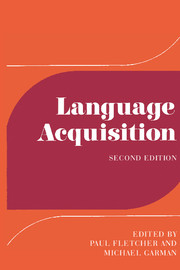Book contents
- Frontmatter
- Contents
- Contributors
- Preface
- Part I Contexts and determinants
- Introduction
- 1 Psychosocial aspects of language acquisition
- 2 Language acquisition and cognition
- 3 Language acquisition and linguistic theory
- 4 Conversations with children
- 5 Learnability
- 6 Variation in child language
- Part II The development of linguistic systems: phonology
- Part III The development of linguistic systems: grammar
- Part IV Later language development
- Notes to chapters
- Bibliography and citation index
- General index
- Titles in the series
6 - Variation in child language
Published online by Cambridge University Press: 05 June 2012
- Frontmatter
- Contents
- Contributors
- Preface
- Part I Contexts and determinants
- Introduction
- 1 Psychosocial aspects of language acquisition
- 2 Language acquisition and cognition
- 3 Language acquisition and linguistic theory
- 4 Conversations with children
- 5 Learnability
- 6 Variation in child language
- Part II The development of linguistic systems: phonology
- Part III The development of linguistic systems: grammar
- Part IV Later language development
- Notes to chapters
- Bibliography and citation index
- General index
- Titles in the series
Summary
One of the most significant developments in recent work on child language has been the increasing number of studies which report the existence of individual differences: differences not only in rate of development but also in characteristic patterns of use and perhaps also in patterns of learning. Since the existence of such differences could have far-reaching implications for the design and use of language programmes in clinical and educational settings, and for policy decisions more generally in the fields of early child care and education, it is important carefully to examine the claims that have been made and, in particular, to evaluate their theoretical and methodological foundations. The first part of this chapter will therefore be devoted to a consideration of these issues, before going on to discuss the main areas in which research on variation has been carried out. Inevitably, no more than an overview can be presented here but, where appropriate, references will be made to books and articles in which specific issues are more fully discussed.
Types of variation
Let us imagine that we pick a group of children and attempt to describe them – their personalities, the sorts of homes they come from, their favourite activities, who they spend their time with, and so on. We shall quickly find that they are all different – different, probably with respect to each of the headings that we consider, and certainly different in the combined profiles that we might attempt to construct.
- Type
- Chapter
- Information
- Language AcquisitionStudies in First Language Development, pp. 109 - 140Publisher: Cambridge University PressPrint publication year: 1986
- 19
- Cited by



